
views
X
Research source
However, since CBD oil is widely available over-the-counter, people are trying it for all sorts of conditions. If you’re considering using CBD oil for Crohn’s disease, check with your doctor first. CBD oil can interact with certain medications, so it’s not for everyone. If your doctor says it’s okay and you decide to try it out, choose a method of taking CBD oil that works for you and start with a low dose.
Talking with Your Doctor

See a doctor to get a diagnosis and treatment for Crohn’s disease. If you have not yet been diagnosed with Crohn’s, see a doctor. Your doctor will diagnose you based on your symptoms and the findings of tests, such as blood and stool tests, colonoscopy, computerized tomography (CT) scan, magnetic resonance imaging (MRI), or a capsule endoscopy. Tell your doctor about any symptoms you have been having, such as: Diarrhea Fatigue Fever Abdominal pain and cramping Loss of appetite and weight loss Blood in the stools Mouth sores Pain and drainage from the anus due to a fistula
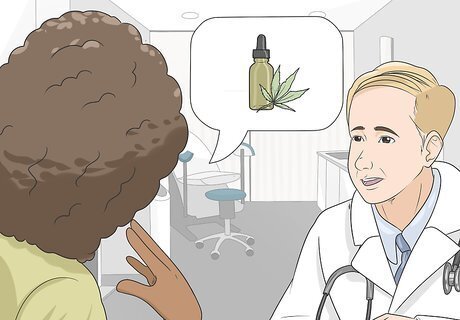
Talk to your doctor about using CBD oil instead of medication. Anti-inflammatory medications are usually the first line of treatment for Crohn’s disease. These medications can help to control the symptoms of Crohn's disease. However, CBD oil may provide some anti-inflammatory effects, so it is possible that taking CBD in place of or along with anti-inflammatory drugs could ease your symptoms. Ask your doctor if this is a possibility. Common types of anti-inflammatory medications for Crohn’s disease include corticosteroids, such as prednisone and budesonide, and oral 5-aminosalicylates, such as sulfasalazine and mesalamine. Your doctor may also recommend immune system suppressors to reduce inflammation, such as infliximab, adalimumab, certolizumab pegol, methotrexate, natalizumab, vedolizumab, and ustekinumab.
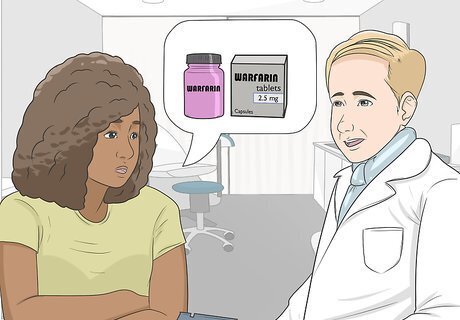
Ask your doctor if CBD oil may interact with your medications. CBD oil is known to interact with certain medications, such as by intensifying their effects or causing them to be less effective. Tell your doctor about all of the medications you take, including any prescriptions, over-the-counter medications, and supplements. Some of the medications that are known to interact with CBD oil include: Risperidone Warfarin Omeprazole Diclofenac Ketoconazole

Discuss other treatment strategies for Crohn’s disease with your doctor. Crohn’s disease treatment often involves a combination of medication and changes to your diet. Ask your doctor what dietary changes might help to relieve your symptoms. Some strategies they may suggest include: Keeping a food diary to see what foods affect you. Avoiding problem foods and beverages, such as popcorn, nuts, fruits and vegetables with the skin left on, and fizzy drinks. Going on a low-residue or low-fiber diet. Eating smaller, more frequent meals.

Stop taking CBD oil and call your doctor for certain symptoms. In rare situations, CBD oil may worsen your Crohn’s disease symptoms. Stop taking CBD oil and call your doctor if you develop any of these symptoms or if they get worse while you're taking CBD oil: Nausea Vomiting Diarrhea Dry mouth Drowsiness Loss of appetite and weight loss Fatigue Abdominal pain
Taking CBD Oil
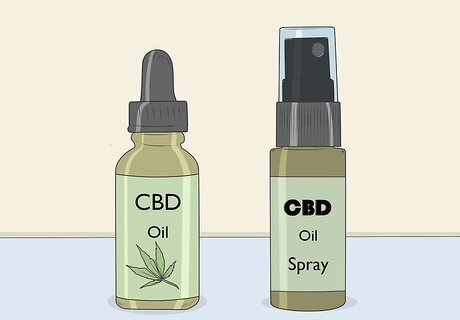
Try using a CBD oil spray or drops for a quick way to administer it. CBD oil is available in the form of drops and sprays that you take sublingually, which is when you place the drops or spray under your tongue. Administering CBD oil this way will bypass your digestive system, so it will work more quickly (in about 15-30 minutes) and there will be less risk of gastrointestinal issues. It also requires no special equipment. Repeat the dose every 4-6 hours or as indicated by the manufacturer’s instructions. Check the label to see how many drops or sprays to administer in each dose.
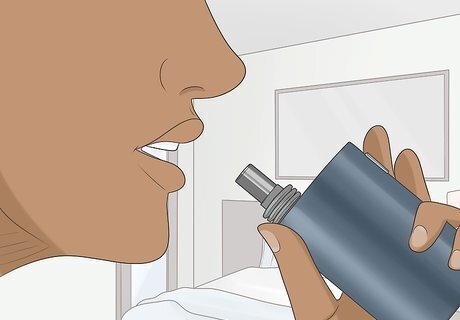
Inhale vaporized CBD oil with a vape pen. This is the fastest delivery method for CBD oil. Inhaling the vapor delivers it into your bloodstream within a few minutes. However, taking CBD oil this way requires purchasing a vaporizing device if you don’t already have one. Be sure to check the manufacturer’s instructions for how much of the oil to use in your vaporizer to get the desired dose. Try inhaling 1 time and waiting for a few minutes. If it has not produced an effect within a few minutes, repeat the dose. This delivery method requires more frequent doses since it leaves your system more quickly than it would with other methods. Repeat the dose every 2-3 hours to maintain the effects.
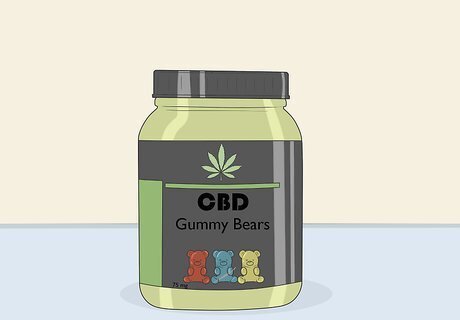
Avoid edibles that might case stomach irritation. You can find CBD oil in the form of edibles, such as candies, baked goods, and beverages. This is a convenient way to take CBD oil, but the food that the CBD oil is mixed into may cause stomach irritation for some people. If your Crohn’s disease symptoms are flaring, try a different delivery route. Eating CBD oil is also a slower delivery method since it has to pass through your digestive system. This mean that you might not feel the effects for 30 minutes or longer.

Apply topical CBD oil if you don't want to eat or inhale it. CBD oil also comes in a form that you can rub onto your skin, which may be helpful for localized pain. For example, you could rub topical CBD oil over your abdomen if you’re experiencing abdominal pain. Applying CBD oil topically may provide 4 to 6 hours of pain relief. Be aware that it’s harder to get a precise dose if you rub it onto your skin instead of taking it orally or smoking it.
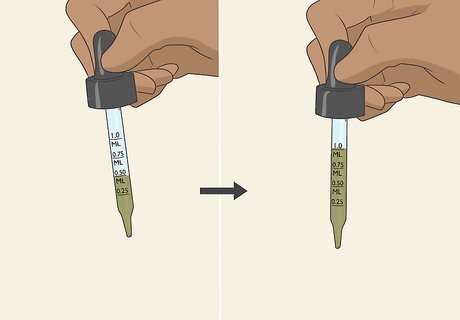
Start out with a low dose of CBD oil and increase it if needed. Check the manufacturer's instructions for the product you select to see what dosage they recommend. Start with the lowest suggested dose and increase it only if the dose does not provide the desired effects. Increase the dose each time you take CBD oil until you find a dose that works for you. High doses of CBD oil—between 150 to 600 mg—may produce a sedative effect. Tip: Do not increase the dose any more once you find the level that works for you.

Follow up with your doctor whether or not CBD oil helps. If CBD oil helps to relieve symptoms of your Crohn’s disease, that’s good news! However, make sure that you keep your doctor informed of your progress. Let them know also if CBD oil is not helping, so you can discuss other treatment options for Crohn’s disease. CBD oil’s effects on people over the long-term have not been studied, so your doctor may want to check in with you once every few months to ensure that you are still doing okay.




















Comments
0 comment